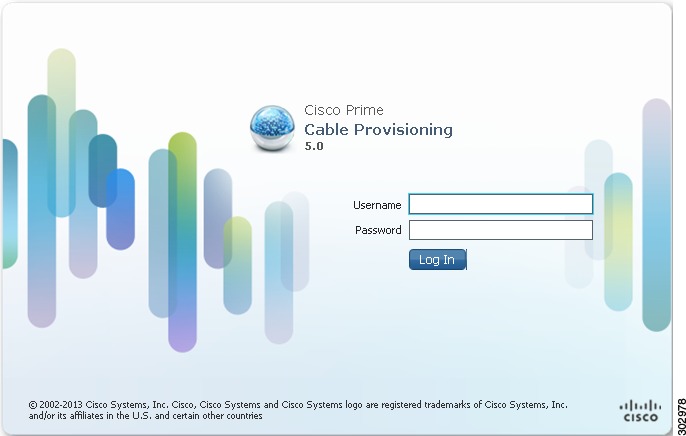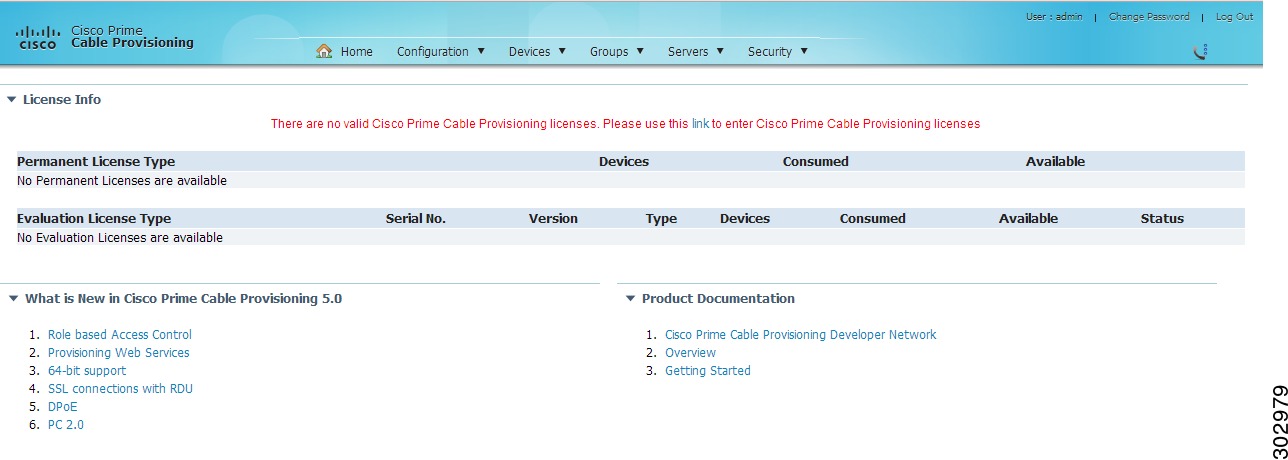

-
Cisco Prime Cable Provisioning User Guide, 5.0
-
Preface
- Getting Started
-
Configuring Prime Cable Provisioning
-
Configuring Prime Cable Provisioning Components
-
Configuring Technologies in Prime Cable Provisioning
-
Configuring Secure Communication
-
Configuring IPv6
-
Configuring the Syslog Utility to Receive Prime Cable Provisioning Alerts
-
Configuring Prime Cable Provisioning Using the User Interface
-
Configuring Groups Using the Admin UI
-
Configuring RBAC Using the Admin UI
-
- Provisioning the Management System
- Monitoring Cisco Prime Cable Provisioning
- Troubleshooting Cisco Prime Cable Provisioning
- Appendices
-
Glossary
-
Index
-
Table Of Contents
Accessing Prime Cable Provisioning Interfaces
Accessing DPE CLI from a Local Host
Accessing DPE CLI from a Remote Host
Accessing Prime Cable Provisioning Interfaces
This chapter describes how to set up and access the Cisco Prime Cable Provisioning user interfaces. There are two user interfaces to access Prime Cable Provisioning, Admin UI and DPE CLI. You must have a valid Prime Cable Provisioning license for these two interfaces else some configurations might fail.
Accessing Admin UI
You can access the Prime Cable Provisioning Admin UI from any computer that can access the URL corresponding to the Prime Cable Provisioning application.
Note
To view the new Admin UI pages, you must manually clear the browser cache after upgrading from an earlier version (4.0.1.x, 4.1.0.x or 4.2.x) to Prime Cable Provisioning 5.0.
Logging In
You can log in to the Prime Cable Provisioning Admin UI if you have a user account either in the RDU or in a remote server such as Radius or TACACS used for authentication. For details about user access and privileges see Configuring Security.
Complete this procedure to access the Prime Cable Provisioning Admin UI:
Step 1
Launch your web browser. Prime Cable Provisioning can be launched using the following browsers:
–
Firefox 10 or higher
–
Google Chrome 17 and higher
–
Internet Explorer 9
Step 2
Enter the administrator's location using this syntax:
http://machine_name:port_number/•
machine_name—Identifies the computer on which the RDU is running.
•
port_number—Identifies the computer port on which the server side of the administrator application runs. The default port number is:
–
8100 for HTTP over TCP
–
8443 for HTTP over SSL
Note
By default, Prime Cable Provisioning redirects all HTTP communications over HTTPS. If you want to bypass the HTTPS redirection, set the property adminui/redirectToHttps to false in the admin.properties file. For more details about this property file, see Using admin.properties.
The main login page, as shown in Figure 4-1, appears.
Figure 4-1 Login Page
Step 3
Enter the default username (admin) and default password (changeme).
If you are logging in for the first time, the Change Password screen appears.
Enter a new password and confirm it. Ensure that the password that you enter has at least 8 characters.
Step 4
Click Login.
The Main Menu page, as shown in Figure 4-2, appears.
Figure 4-2 Main Menu Page
Note
You can use the link at the top of the page to add the license file. For details, see Chapter 2 "Managing Licenses".
Admin UI Operations
When you log into Prime Cable Provisioning, the portlets that you see on the home page depend on your user privileges. The operations that can be performed using the Admin UI are explained in the following chapters:
•
Chapter 11 "Configuring Prime Cable Provisioning Using Admin UI"
•
Chapter 18 "Provisioning Devices Using Admin UI"
•
Chapter 13 "Configuring RBAC Using Admin UI"
•
Chapter 12 "Configuring Groups Using Admin UI"
•
Chapter 21 "Monitoring Servers Using Admin UI"
Changing Password
All users of Prime Cable Provisioning can change their password. For better security this operation is performed in the HTTPS mode.
To change your password:
Step 1
Click the Change Password tab at the top-right corner of any page.
A Change Password dialog box appears.
Step 2
Enter a new password and confirm it. Ensure that the password that you enter has at least 8 characters
Step 3
Click Submit.
The application returns you to the Home page.
Logging Out
Complete this procedure to log out of Prime Cable Provisioning:
Step 1
Click the Logout tab at the top-right corner of any page.
A confirmation dialog box appears.
Step 2
Click OK.
The application returns you to the Login page. See Figure 4-1.
Accessing DPE CLI
The Prime Cable Provisioning CLI is an IOS-like command-line interface that you use to configure and view the status of the DPE by using Telnet or SSH. The CLI supports built-in command help and command autocompletion.
You can enable authentication of the CLI through a locally configured login and privileged passwords, or through a remote username and password for a TACACS+ service.
To access the DPE CLI, open a Telnet session to port 2323 from a local or remote host.
Accessing DPE CLI from a Local Host
To access the CLI from a local host, you can use:
# telnet local_hostname 2323
or
# telnet 0 2323
Accessing DPE CLI from a Remote Host
To access the CLI from a remote host, enter:
# telnet remote-hostname 2323
Note
If you cannot establish a Telnet connection to the CLI, the CLI server might not be running. You may need to start the server; enter:
# /etc/init.d/bprAgent start cli
After you access the CLI, you must enter the DPE password to continue. The default login and privileged passwords are changeme.
See the Cisco Prime Cable Provisioning 5.0 DPE CLI Reference Guide for specific information on the CLI commands that a DPE supports.
Accessing SNMP Agent
Prime Cable Provisioning supports management of servers via SNMP. Specifically, an SNMP-based management system can be used to monitor Prime Cable Provisioning server state, license utilization information, server connections, and server-specific statistics
You can configure the SNMP agent:
•
On the RDU, using the SNMP configuration command-line tool (see Monitoring Servers Using SNMP) or via the API.
•
On the DPE, using the snmp-server CLI commands. See the Cisco Prime Cable Provisioning 5.0 DPE CLI Reference Guide.

 Feedback
Feedback

